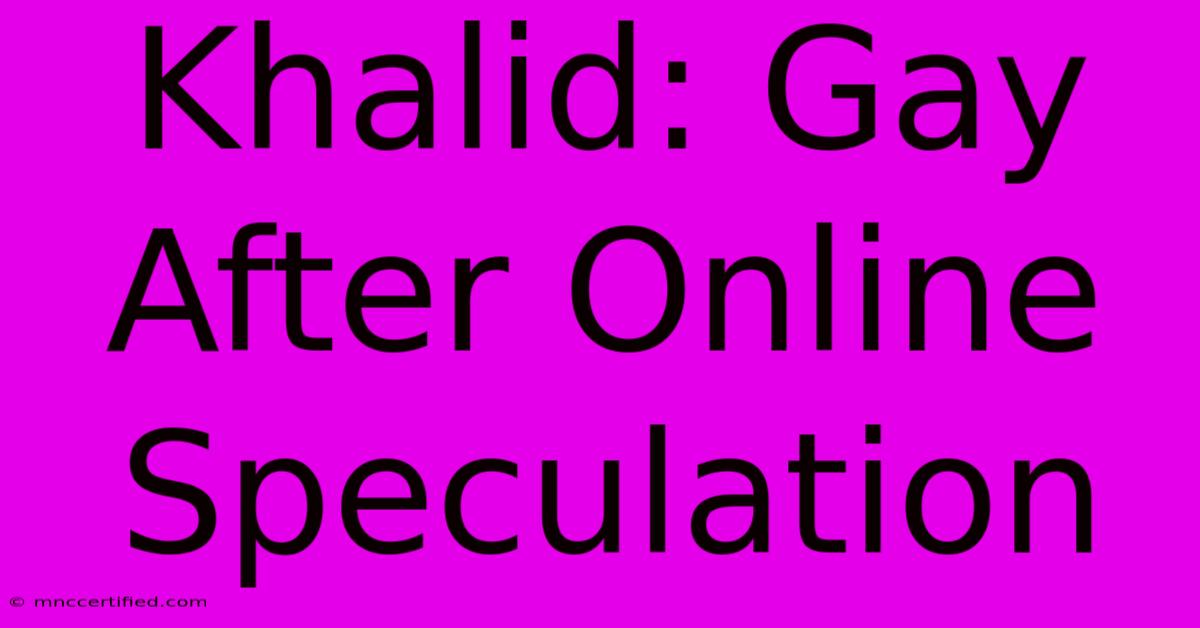Khalid: Gay After Online Speculation

Table of Contents
Khalid: Addressing Gay Speculation – A Deep Dive into Privacy and Representation
Online speculation surrounding Khalid's sexuality has been a persistent theme, prompting conversations about celebrity privacy, LGBTQ+ representation, and the pressures of public image. This article delves into the complexities of this ongoing discussion, examining the nuances of Khalid's public statements and the broader implications for both the artist and his fanbase.
The Online Speculation: A Timeline of Events
Rumors regarding Khalid's sexuality have circulated online for years. These rumors, often fueled by social media interpretations of his music, style, and interactions, have gained traction despite a lack of explicit confirmation from the artist himself. While some fans interpret certain lyrics or stylistic choices as indicators of his sexual orientation, others criticize this form of speculation as intrusive and potentially harmful. This highlights a crucial tension: the desire for LGBTQ+ representation in mainstream media versus respecting an individual's right to privacy.
Analyzing the Interpretations: Music, Style, and Fan Theories
Many online discussions analyze Khalid's music for hidden messages, focusing on song lyrics and themes that some believe point to a gay or bisexual identity. Similarly, his fashion choices and public image are scrutinized for clues. However, it's crucial to remember that interpreting artistic expression requires nuance and avoids projecting personal assumptions onto the artist's creative work. Fans engaging in these discussions should prioritize respectful dialogue and avoid making definitive statements based on interpretation alone.
Khalid's Public Stance: Privacy and Personal Boundaries
Khalid, throughout his career, has maintained a level of privacy regarding his personal life. He hasn't explicitly addressed the speculation surrounding his sexuality, opting instead to focus on his music and creative endeavors. This choice underlines the importance of respecting an individual's right to control their narrative and to determine what aspects of their personal life they wish to share publicly. Pressuring a celebrity to disclose their sexual orientation is inappropriate and disregards their personal boundaries.
The Importance of Respecting Privacy in the Digital Age
The ease with which information – both accurate and inaccurate – spreads online amplifies the pressure on public figures to constantly address speculation. This underscores the need for responsible online behavior. Sharing unsubstantiated claims, fueling harmful gossip, or invading someone's privacy, regardless of their fame, is unacceptable. A healthy online environment prioritizes respect, empathy, and the understanding that celebrities are individuals entitled to personal space.
The Broader Conversation: LGBTQ+ Representation and Public Discourse
While respecting Khalid's privacy is paramount, the ongoing conversation also highlights the importance of diverse representation within the music industry and beyond. The desire for more visible LGBTQ+ artists reflects a broader societal yearning for greater inclusion and acceptance. However, this desire should never come at the expense of individual agency and the right to self-determination.
Finding a Balance: Advocacy and Respect
Navigating this complex terrain requires a delicate balance. Advocating for greater LGBTQ+ visibility is essential, but it should be done in a manner that respects individual choices and avoids pressuring anyone to disclose personal information prematurely. Ultimately, authentic representation blossoms when individuals feel empowered to share their stories on their own terms.
Conclusion: Beyond Speculation
The ongoing discussion about Khalid's sexuality serves as a valuable case study for examining the complexities of celebrity culture, online privacy, and the evolving landscape of LGBTQ+ representation. By promoting responsible online behavior, fostering respectful dialogue, and valuing individual autonomy, we can create a more inclusive and supportive environment for everyone. The focus should remain on celebrating Khalid's music and artistry, while acknowledging and respecting his right to privacy and self-expression.

Thank you for visiting our website wich cover about Khalid: Gay After Online Speculation. We hope the information provided has been useful to you. Feel free to contact us if you have any questions or need further assistance. See you next time and dont miss to bookmark.
Featured Posts
-
140m Euro Millions Numbers Nov 19 Results
Nov 23, 2024
-
Gms F1 Bid Grid To Expand
Nov 23, 2024
-
Massachusetts Housing Bond Bill
Nov 23, 2024
-
Wall Street Memes Casino Review
Nov 23, 2024
-
Stream Leicester Vs Chelsea Game
Nov 23, 2024